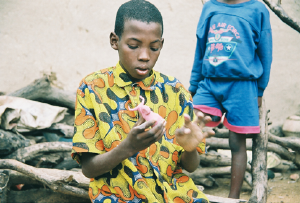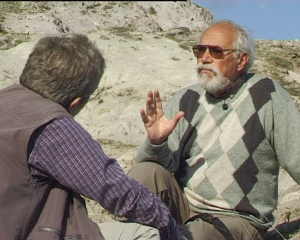
Asen Balikci has been a leading
figure in making ethnographic films for many decades. In a series of talks
between Balikci and filmmaker Rolf Husmann in different locations, the life and
work of Asen Balikci are shown and discussed: the film takes us from Asen’s
youth in Istanbul to his career in Canada where he became famous for making the
Netsilik Eskimos Series, to filming in Afghanistan and then turning to two
other activities of his: as a networker for the Commission on Visual
Anthropology (CVA) and as a teacher of Summer Schools in Siberia and Bulgaria.
His film work among the Bulgarian Pomak and his still ongoing work in
Rolf
Husmann
Rolf Husmann (born 1950) is a German anthropologist
with a specialisation in ethnographic filmmaking and the anthropology of sport.
Apart from regularly teaching (visual) anthropology at various universities
worldwide, he works since 1992 at the “IWF Knowledge and Media” in Göttingen (
Luc de Heusch. Wild Thinking

“Do gulls fly
away for a reason?”
“Why are we here?”
“I think therefore I Am” but why?
Thanks to his questioning of the world, the ethnologist and film-maker, Luc de Heusch allows us to enter his thoughts, thoughts that are both scientific (structuralist) and poetic (surrealist). Building bridges between different cultures, his films and books attest to the diversity that exists within the realm of reality, and this diversity allows the very distinct worlds of art, war, cooking, theatre, magic and love to communicate with one and other with incredible ease.
Karine de
Villers
Karine de Villers was born in Quito, Ecuador in
1965. She obtained a degree in art history and archaeology from the Universite
Libre in Brussels. Since 1990, she has worked in various capacities on short
and medium-length documentaries. Selected filmography: 1990 “I'm your neighbour”, 1996 “Place
a Saint Josse”, 1999 “Littlе castlе”, 2001 “How I see Her”, 2003 “The
Men of My Life”, 2004 “I'm alive”.
Wanderers
The film shows the seasonal migration of a Khanty family from their summer campsite to their winter campsite. The family uses Russian to talk with strangers, such as the Nenets living in the same area, but use their Finno-Ugrian mother tongue among themselves. Small languages and dialects are disappearing at an alarming pace throughout the world. Khanty, one of the many endangered languages, is spoken in the film.
The Mansi and Khanty live in the vast watershed of the River Ob in western Siberia. The small group shown in the film lives in the northernmost area of this region. Their archaic way of life can in part be attributed to the area’s peripheral nature because they have been less affected by industrialisation and civilisation than the other groups.
The film offers a glimpse into the daily life of the Khanty reindeer herders, the dangerous winter migration, and their concerns. The camera becomes their friend with whom they talk and through it speak to the viewer. This intimacy enables a better understanding of their life.
Zoltan Szalkai
Zoltan Szalkai,
born in 1961, is a Hungarian film director. He studied
agriculture and geology before turning to a career in directing documentary
films. He works as an independent filmmaker, producing and directing
documentaries for the local and international media. He has made about 40 documentaries during
the last 15 years on locations like
Where the Peuls Go
In one of the poorest states of the world in Mali, West Africa, the Peul people continue to exist as a seminomad society. These powerful warriors, the rulers of the area since centuries always monopolised the breeding and living pastoral life. For them, breeding is not a profession but a way of life. “It is not the cow which was made for the Peul but the Peul for the cow,” a Peul saying goes.
Intimate and emblematic portraits tell their current destiny. Currently the Peul are confronted with the terrible question of their future. In a Malian society full of transformation, can their traditions and the way life continue to exist in front of the inevitable modernization of the country? Nowadays the breeding is related to big cities needs and to the international trade. The Peul’s way of life based on the sacred nature of bovine is on the decline: the cow becomes a butcher product. The attraction for the urban lifestyle and comfort announces an inescapable disappearance of a civilization.
Through at touching meeting with this traditional culture, the narrative shows the universal movement of transformation of rural mentalities.
Sylvain Vesco
Sylvain Vesco discovered Africa at the age of sixteen and
immediately fell in love with it. After several journeys in Mali, he got
interested in the traditional culture growth of the Peul. He studied Visual
Antropology. Where the Peuls Go is his first film.
On the Road with Maruch
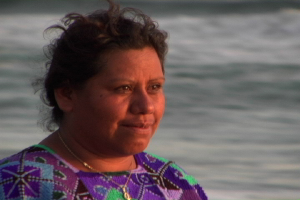
This anthropological documentary takes us into the world of the indigenous woman Maruch de la Cruz Pérez. Maruch is a 42-year old, unmarried woman from Chiapas who loves travelling in her country to explore other cultures and to learn from them. On account of her biography she has a quite problematic stand in her traditional village Zinacantan on the one hand, but on the other hand, she has to face racism and sexism in Mexican society while she is travelling. Roadtripping through Chiapas with Maruch and the filmcrew gives an insight in the culture and society of a post-war
region. However it is also an intimate portrait of an indigenous woman who is trying to live a self-determined life, that will give her freedom from the traditions of her community, her former husband, and the terror of paramilitarian groups.
In this film it is possible to explore Chiapas from an indigenous point of view. The documentary starts with an “ethnofictional“ scene showing the main protagonist Maruch performing her daily life. This sequence is filmed on a 16mm-film. After 5 minutes the format changes to video. The non-fictional part starts with the appearance of the filmcrew and the beginning of the roadtrip through Chiapas. Maruch is the journey`s guide. She has a Super8 camera, too, and her footage is included in the film as a part of the indigenous perspective. Methodologically the film is inspired by anthropological filmmaking-theory based on Jean Rouch´s „Cinema Verité“ and „Ethnofiction“. Another important element is the concept of „shared anthropology“, which is an attempt, to corroborate the protagonist´s voice in order to empower the marginalized indigenous woman from Chiapas.
Florian Walter
Florian Walter studied
Social Anthropology and Ethnology of Latin America in Göttingen, San Cristóbal
de Las Casas (Mexico), Puebla (Mexico) and Berlin. He earned his master’s
degree in Social and Cultural Anthropology at the Freie Universität Berlin in
2006. Since then he has been in the doctorate program of the BIK (Institute of
Cultural Research Bremen), Universität Bremen, Guest Researcher at the
CESMECA-Unicach in San Cristóbal de las Casas, Mexico, and a lecturer at the
Institute of Social Anthropology, Freie Universität Berlin. His main fields of
interest are theory and practice of anthropological filmmaking, art and anthropology,
indigenous media projects, communication theory and post-modern theories of
culture. His regional focus comprises the following regions: Mexico, Guatemala,
Nicaragua, East Africa and Europe.
Bilal
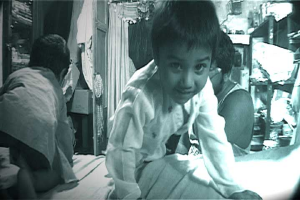
Bilal is a small three years old boy, living with his parents and infant brother in a small household in central Kolkata. The tiny room is dark, almost nothing is visible inside.
In fact, Bilal’s parents don’t need any light to see things around; they are blind. So together they live as if in a game of seeing and not seeing. Though of a very tender age, Bilal is fully aware of the physical handicap of his parents. He knows how to communicate with them through sounds and touch. He is never jobless – be it guiding his blind parents through the traffic or training up the art of making mischiefs to his brother. He has become his parents window to the world.
Whenever Bilal is in the mood for mischief, his parents become strict and their son jumps into the world outside. Bilal tastes life on street from his elders – it's hard. But he never gives up. Very unusually for our times, Bilal’s upbringing and care seems to have become a collective responsibility of all the neighbors. The film tells this curious story by observing the little boy over a year and capturing rare moments of sharing love, fun, cruelty and hope… the wonder world of Bilal.
Sourav Sarangi
Sourav Sarangi
was born in 1964 in India. He studied geology initially but later joined Film
and Television Institute of India, a famous film school located at Pune and specialized in film editing.
The few documentaries Sourav made brought awards and accolade both in India and
worldwide.
Normally he spends long time to observe and interact with his characters to
bring out the inner reality in a cinematic way, which is again minimalist and
simplest possible. He has also worked for television extensively, but strangely
has no television set at home.
Kihnu wedding
Summer, Kihnu island, women in red skirts and a three-day wedding party.
Yolki palki
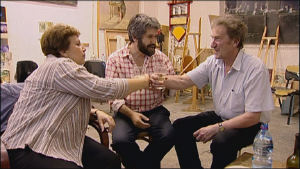
Director Alexander Gentelev takes us on a personal journey to seek out fellow passengers from the flight on which he came to Israel in the early 1990s.
Through the stories of Russian immigrants scattered across Israel and outside of it – from a simple kibbutz in the valley to a lavish office atop a Moscow skyscraper – the image of the last great wave of Russian immigration is unfolded in all its facets.
The complexity underlying the stereotypes attached to the Russian immigration, the difficulties, the achievements and the failures, are at the center of this film that painfully confronts the question of what it means to be Israeli and what chance does a public of over a million people have of receiving the stamp of "Israeliness" – a question that has accompanied the director since his arrival in Israel.
Alexander Gentelev
Has
studied philosophy
and Psychology – St. Petersburg University (MA 1982) and film studies, theatre and music in St Petersburg Film
Academy (MA, 1988). He has worked as a documentary director in Russia TV (1982-1989),
being responsible on production and acquisition of documentary projects. 1993–1998
he directed 10 documentary films for a weekly documentary series at Channel 2,
Israel. Since then he has produced several documentaries in Israel.
